新目标2023年中考一轮教材复习 课件八年级上册 Units 1-2
文档属性
| 名称 | 新目标2023年中考一轮教材复习 课件八年级上册 Units 1-2 | 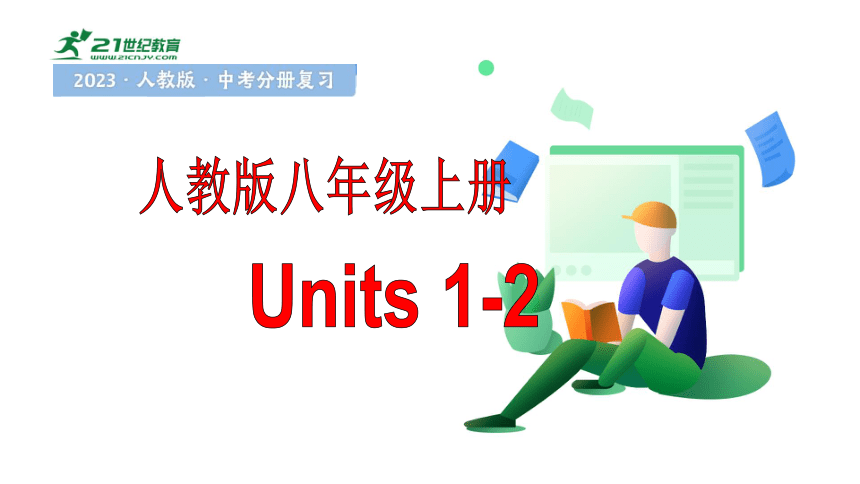 | |
| 格式 | pptx | ||
| 文件大小 | 1.8MB | ||
| 资源类型 | 试卷 | ||
| 版本资源 | 人教新目标(Go for it)版 | ||
| 科目 | 英语 | ||
| 更新时间 | 2023-02-26 11:29:17 | ||
图片预览

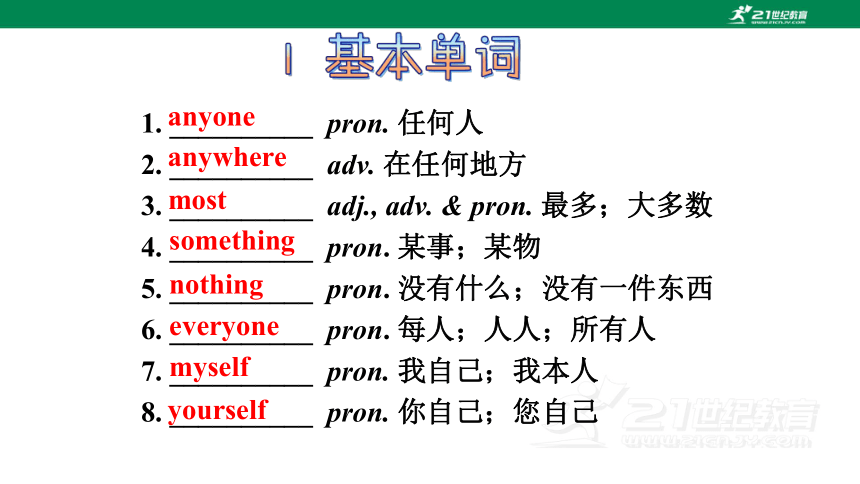
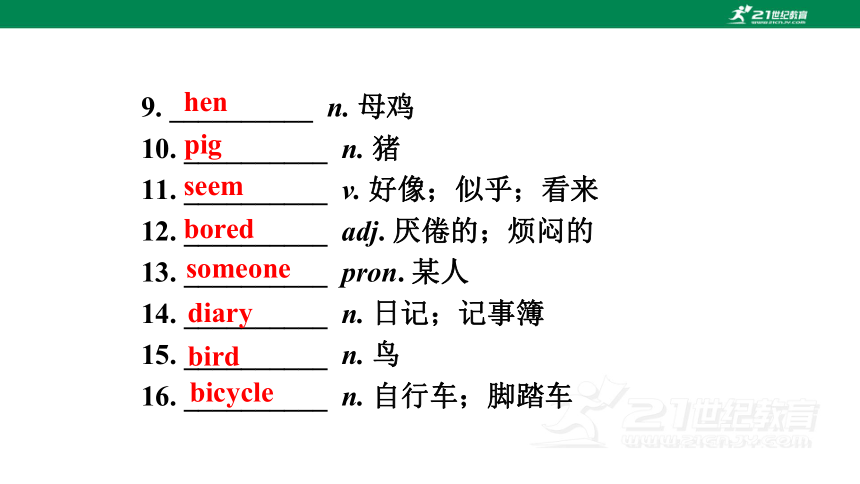
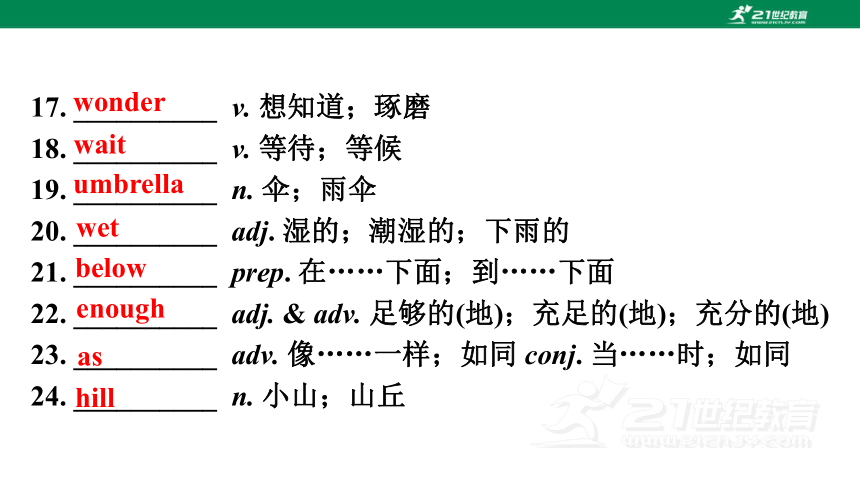
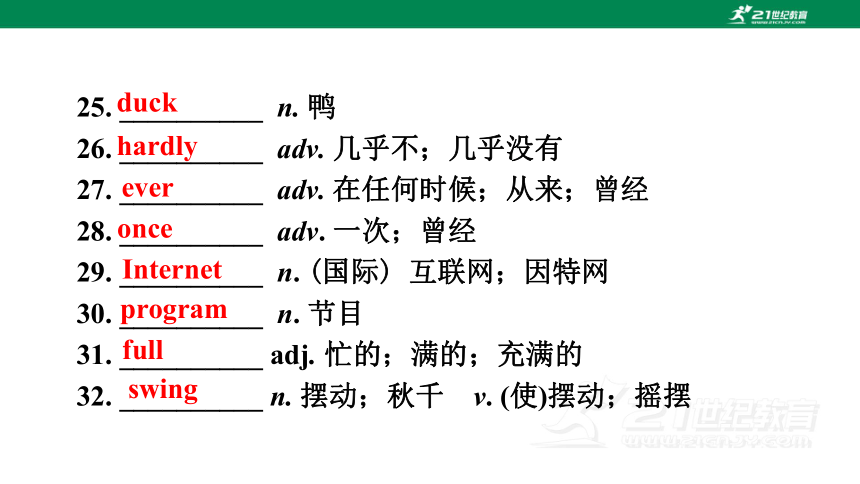
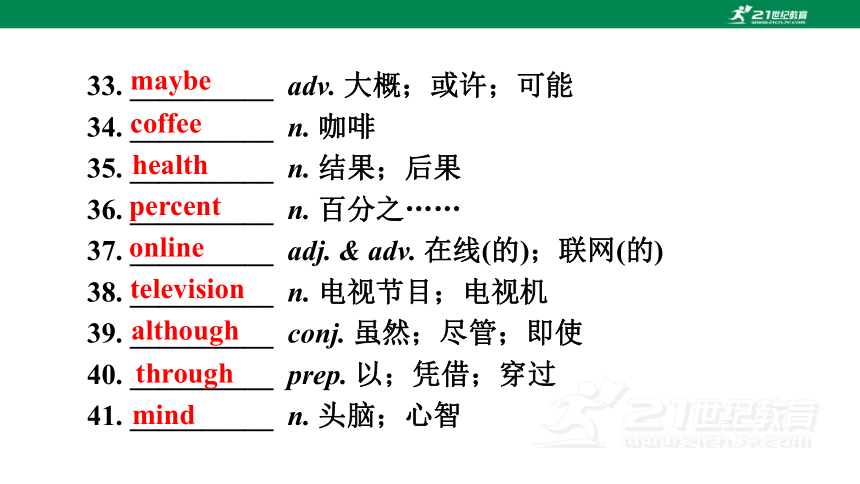
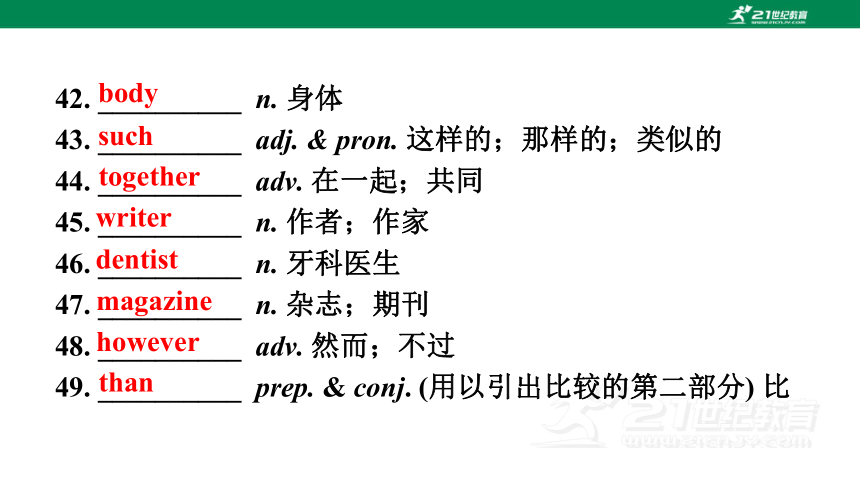
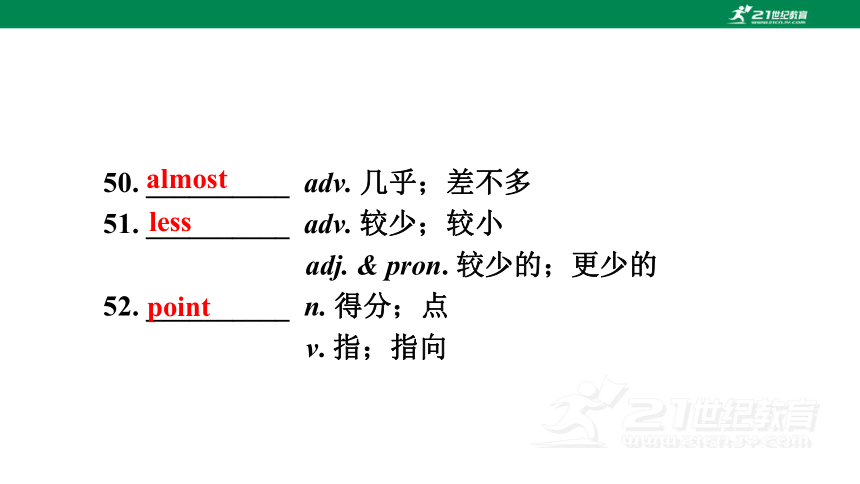
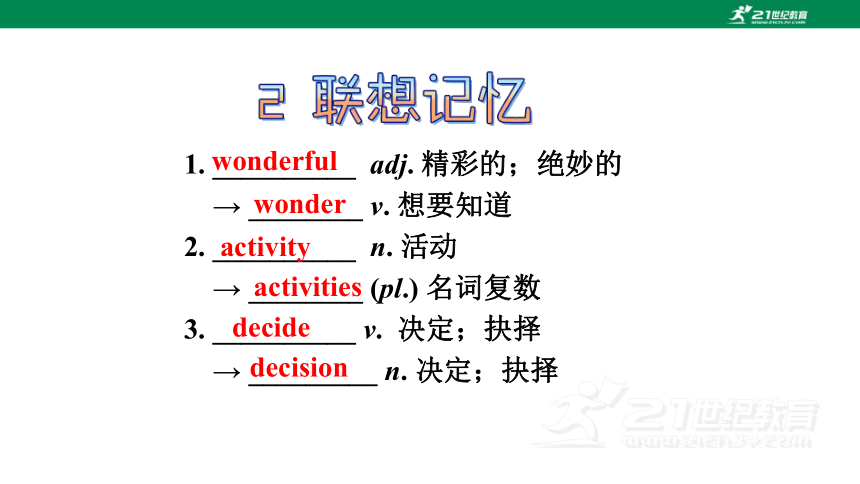
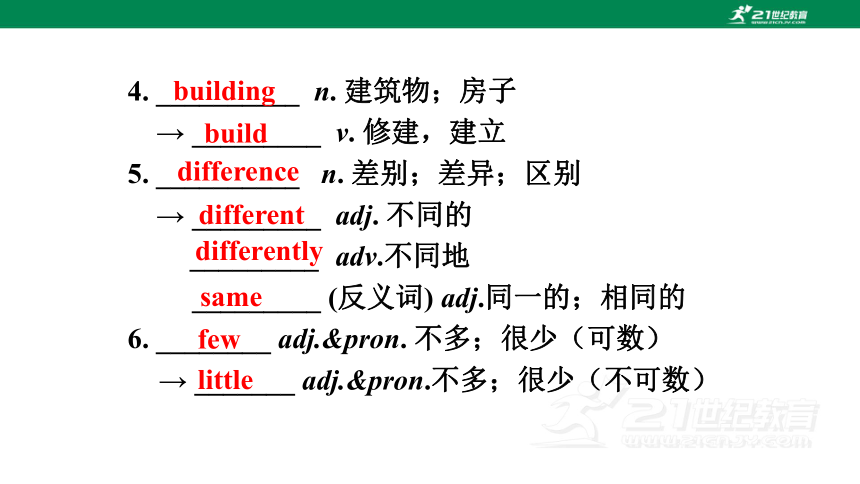
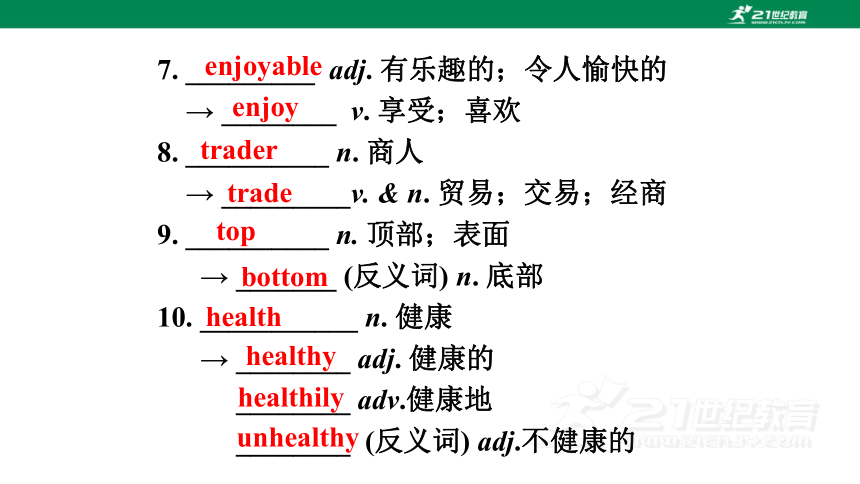
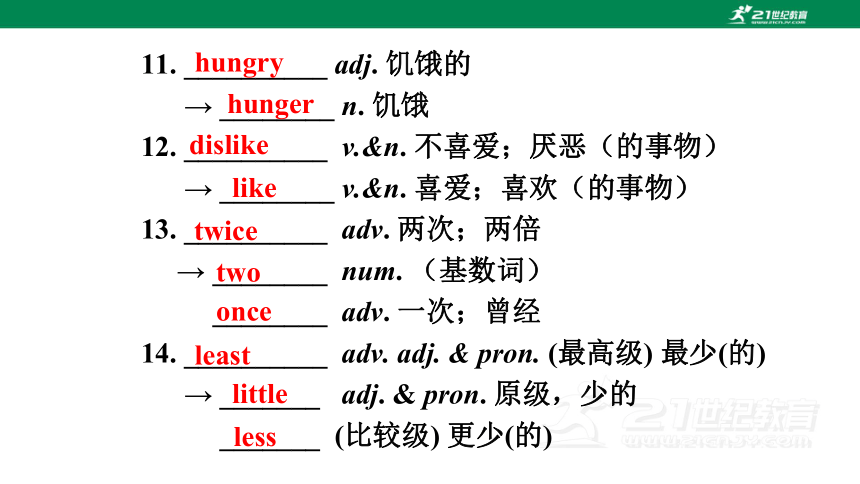
文档简介
(共116张PPT)
Units 1-2
人教版八年级上册
1. __________ pron. 任何人
2. __________ adv. 在任何地方
3. __________ adj., adv. & pron. 最多;大多数
4. __________ pron. 某事;某物
5. __________ pron. 没有什么;没有一件东西
6. __________ pron. 每人;人人;所有人
7. __________ pron. 我自己;我本人
8. __________ pron. 你自己;您自己
anyone
anywhere
most
something
nothing
everyone
myself
yourself
9. __________ n. 母鸡
10. __________ n. 猪
11. __________ v. 好像;似乎;看来
12. __________ adj. 厌倦的;烦闷的
13. __________ pron. 某人
14. __________ n. 日记;记事簿
15. __________ n. 鸟
16. __________ n. 自行车;脚踏车
hen
pig
seem
bored
someone
diary
bird
bicycle
17. __________ v. 想知道;琢磨
18. __________ v. 等待;等候
19. __________ n. 伞;雨伞
20. __________ adj. 湿的;潮湿的;下雨的
21. __________ prep. 在……下面;到……下面
22. __________ adj. & adv. 足够的(地);充足的(地);充分的(地)
23. __________ adv. 像……一样;如同 conj. 当……时;如同
24. __________ n. 小山;山丘
wonder
wait
umbrella
wet
below
enough
as
hill
25. __________ n. 鸭
26. __________ adv. 几乎不;几乎没有
27. __________ adv. 在任何时候;从来;曾经
28. __________ adv. 一次;曾经
29. __________ n. (国际) 互联网;因特网
30. __________ n. 节目
31. __________ adj. 忙的;满的;充满的
32. __________ n. 摆动;秋千 v. (使)摆动;摇摆
duck
hardly
ever
once
Internet
program
swing
full
33. __________ adv. 大概;或许;可能
34. __________ n. 咖啡
35. __________ n. 结果;后果
36. __________ n. 百分之……
37. __________ adj. & adv. 在线(的);联网(的)
38. __________ n. 电视节目;电视机
39. __________ conj. 虽然;尽管;即使
40. __________ prep. 以;凭借;穿过
41. __________ n. 头脑;心智
maybe
coffee
health
percent
online
television
although
through
mind
42. __________ n. 身体
43. __________ adj. & pron. 这样的;那样的;类似的
44. __________ adv. 在一起;共同
45. __________ n. 作者;作家
46. __________ n. 牙科医生
47. __________ n. 杂志;期刊
48. __________ adv. 然而;不过
49. __________ prep. & conj. (用以引出比较的第二部分) 比
body
such
together
writer
dentist
magazine
however
than
50. __________ adv. 几乎;差不多
51. __________ adv. 较少;较小
adj. & pron. 较少的;更少的
52. __________ n. 得分;点
v. 指;指向
almost
less
point
1. __________ adj. 精彩的;绝妙的
→ ________ v. 想要知道
2. __________ n. 活动
→ ________ (pl.) 名词复数
3. __________ v. 决定;抉择
→ _________ n. 决定;抉择
wonderful
activity
wonder
activities
decide
decision
4. __________ n. 建筑物;房子
→ _________ v. 修建,建立
5. __________ n. 差别;差异;区别
→ _________ adj. 不同的
_________ adv.不同地
_________ (反义词) adj.同一的;相同的
6. ________ adj.&pron. 不多;很少(可数)
→ _______ adj.&pron.不多;很少(不可数)
building
build
difference
different
differently
same
few
little
7. _________ adj. 有乐趣的;令人愉快的
→ ________ v. 享受;喜欢
8. __________ n. 商人
→ _________v. & n. 贸易;交易;经商
9. __________ n. 顶部;表面
→ _______ (反义词) n. 底部
10. ___________ n. 健康
→ ________ adj. 健康的
________ adv.健康地
________ (反义词) adj.不健康的
enjoy
enjoyable
trader
trade
top
bottom
healthily
healthy
health
unhealthy
11. __________ adj. 饥饿的
→ ________ n. 饥饿
12. __________ v.&n. 不喜爱;厌恶(的事物)
→ ________ v.&n. 喜爱;喜欢(的事物)
13. __________ adv. 两次;两倍
→ ________ num. (基数词)
________ adv. 一次;曾经
14. __________ adv. adj. & pron. (最高级) 最少(的)
→ _______ adj. & pron. 原级,少的
_______ (比较级) 更少(的)
hungry
hunger
dislike
like
twice
two
once
least
little
less
15. ________ v. 消失;灭亡;死亡
→ ______ n. 死;死亡
______ adj. 死的;失去生命的
16. ________ adv. 几乎;差不多
→ ______ adv. 几乎不;几乎没有
die
death
dead
almost
hardly
1. ____________________ 到达
2. ____________________ 至少;不少于;起码
3. ____________________ 坏 / 好习惯
4. ____________________ 因为
5. ____________________ 对……有好处
6. ____________________ 决定做某事
7. ____________________ 吃健康的早餐
8. ____________________ 给……的感觉;感受到
9. ____________________ 去野营 / 逛商店;购物
at least
bad / good habits
because of
be good for
decide to do sth.
feel like
go camping / shopping
arrive in
eat a healthy breakfast
10. _______________________ 上网
11. _______________________ 去夏令营
12. _______________________ 去海滩 / 爬山
13. _______________________ 去看牙医
14. _______________________ 几乎从不
15. _______________________ 上钢琴课
16. _______________________ 帮忙做家务
17. _______________________ 在过去
go online
go to summer camp
go to the beach/ mountains
go to the dentist
hardly ever
have piano lessons
help with housework
in the past
18. _________________ 垃圾食品
19. _________________ 记日记
20. _________________ 继续做某事
21. _________________ 少于
22. _________________ 看地图
23. _________________ 多于
24. _________________ 大部分时间
25. _________________ 当然;自然
26. _________________ 旧习难改
27. _________________ 相当多;不少
junk food
keep a diary
keep doing sth.
less than
look at the map
more than
most of the time
of course
quite a few
Old habits die hard.
29. ______________________ 备考
30. ______________________ 例如;像……这样
31. ______________________ 摇摆舞
32. ______________________ 洗牙
33. ______________________ 这个问题的答案
34. ______________________ 山顶
35. ______________________ 尝试做某事
36. ______________________ 一周两次
37. ______________________ 等候;等待
study for tests
such as
swing dance
teeth cleaning
the answer to the question
the top of the hill
try doing sth.
twice a week
wait for
28. ______________________ 待在家
stay at home
1. I felt like I was a bird.
2. Still no one seemed to be bored.
3. I wonder what life was like here in the past.
4. There was nothing much to do in the evening but read.
5. It is good to relax by using the Internet or watching game shows, but we think the best way to relax is through exercise.
6. So start exercising before it's too late!
7. —Where did Tina go on vacation
—She went to the mountains.
8. —How did you like it
—Well, it was my first time there, so everything was interesting.
词条 意义 用法
few 很少;几乎没有 表否定,修饰可数名词复数。
a few 几个;一些 表肯定,修饰可数名词复数。
little 很少;几乎没有 表否定,修饰不可数名词。
a little 一点;一些 表肯定,修饰不可数名词。
few, a few, little与a little
1. few adj. & pron. 不多;很少
用few/a few/little/a little完成句子。
1) There is ________ juice in the bottle. Please go and buy some at once.
2) Well done! There are ________ mistakes in your homework today.
3) Some doctors arrived ________ minutes later.
4) Come in and have ________ coffee.
little
few
a few
a little
2. seem v. 好像;似乎;看来
【归纳】
It seems+ that… 看来……
seem to do sth. 似乎做某事
seem (+to be) +adj. 看上去……
seem + n. 似乎……
seem
完成句子。
1) 今天他似乎很不高兴。
He _______ _______ _______ today.
2) 她似乎是个聪明的女孩。
She _______ _______ _______ _______.
3) 安娜似乎不太喜欢这个主意。
Anna doesn’t _______ ______ ______ the idea.
4) 看来他们没有赶上火车。
______ ______ ______ they didn’t catch the train.
seems quite unhappy
seems a clever girl
seem to like
It seemed that
3. decide
【归纳】
n. decision make a decision 做决定
decide to do sth. 决定做某事
decide v.
决定
decide on/upon (doing) sth. 决定做某事
decide + 宾语从句
decide + 特殊疑问词+ to do
完成句子。
1) 我还没决定如何到达山顶。
I haven’t decided _______ _______ _______ to the top of the mountain.
2) 他们每个人都决定做一个报告。
Each of them _______ _______ _______ a talk.
3) 你们对去长城旅游的事作出决定了吗?
Have you _______ _______ the trip to the Great Wall
how to get
decided to give
decided on
单项选择。
4) —You can ________ between joining the dancing club and going to the chess club.
—I consider going to the chess club, for I like playing chess better.
A. decide B. guess C. hide D. wait
(2022安徽中考)
A
5) —Jack, will your family move to Shanghai
—Yes. My parents has made the ________ .
A. problem B. challenge C. decision
(2022黑龙江牡丹江鸡西中考)
C
4. try
【归纳】
try
尝试;设法;努力
have a try 试一试
v.
try to do sth. 努力做某事
try doing sth. 尝试做某事
try on 试穿 try out 试验
try one’s best to do sth.
n.
1) — Michael, ________ this shirt.
— Oh, it looks nice on me!
A. try on B. put down C. take off D. throw away
(2022河北中考)
单项选择。
A
2) —Could you please _______ some ideas for dealing with students’ problems
—Yes, less homework and more outdoor activities may be good ways. (2021青海中考)
A. come up with B. look back at C. try out
3) Scientists all over the world are _______ new medicine to fight COVID-19. (2021云南昆明中考)
blowing out B. trying out
C. leaving out D. keeping out
A
B
5. wonder v. 想知道;琢磨
wonder与want to know 同义,其后常接if, where,when,who,why等引导的宾语从句或“疑问词 + 不定式”结构。
wonder n. 奇迹
Ⅰ. 写出下列划线部分的词性及含义。
1) Li Qiang wondered who could use the machine.
___________ ___________
2) The pyramids are one of the wonders of the world.
___________ ___________
Ⅱ. 根据汉语意思完成英语句子,每空一词(含缩略形式)。
3) 李雯想知道为什么你没去她家。
Li Wen wonders ________ ________ _______ go to her house.
4) 马丁想知道下一步该怎么办。
Martin wonders ________ ________ ________ next.
动词 想知道
名词 奇迹
why you didn’t
what to do
6. wait v. 等待;等候
常用结构有:wait for sb. / sth.;wait (for) + 一段时间;
wait for sb. / sth. to do sth.;
wait to do sth.。
口语中常用短语: can’t wait 等不及
can’t wait to 迫不及待地想要做某事
根据汉语意思完成英语句子,每空一词。
1) 我妈正在等我呢。
My mother is ________ ________ me.
2) 我迫不及待地打开了他的礼物。
I ________ ________ ________ open his gift.
3) 恐怕你需要再等10分钟。
I’m afraid you have to _______ _______ another 10 minutes.
waiting for
couldn’t wait to
wait for
4) 很多人正在等着买火车票。
A lot of people are ________ ________ ________ train tickets.
5) 我们正在等雨停。
We are ________ ________ ________ ________ ________ stop.
waiting to buy
waiting for the rain to
7. enough
【归纳】
enough
adv. 足够地;充分地。
置被修饰词后。
... enough to ... 足够……可以……
adj. 足够的;充足的
置名词前后均可。
完成句子。
1) 我们有足够的书给这些孩子们。
We have ________ ________ for the children.
2) 这个房间足够大,可以容纳二十个人。
The room is ________ ________ to hold 20 people.
3) 我们离开得不够早。
We didn’t leave ________ ________.
enough books
big/large enough
early enough
/books enough
单项选择。
4) Amy did very well in her report. She is ________ to pay attention to every detail.
A. enough careful B. careful enough
C. enough careless D. careless enough
(2022 江苏宿迁中考)
C
8. hardly adv. 几乎不;几乎没有 表否定意义。
hardly ever 几乎不
【注意】hardly并非hard的副词形式。
hardly
adv. 几乎不
表否定
hard
adj. 困难的;硬的;辛苦的
adv. 努力地;强烈地
【语境应用】用hard/hardly完成句子。
1) The question is too _________ for me to answer.
2) Tim’s sister studies _________ at school.
3) It is snowing _________ outside. You had better stay at home.
4) —John, could you speak loudly I can _________ hear you.
—Sorry, I will.
hard
hard
hard
hardly
单项选择。
5) Chinese women’s football team members worked _______ and won the Asian Cup.
A. widely B. closely C. hardly D. simply
(2022江苏镇江中考)
6) I _______ go to the art museum because I like painting.
A. often B. hardly C. never
(2022吉林中考)
B
A
3) —Jessica, it’s raining ______ outside.
—Oh, you should be ______ when you drive to work.
A. hard; careful B. hardly; careful
C. hard; carefully D. hardly; carefully
(2022四川达州中考)
4) Linda spoke too quietly. I could ______ hear her at the back.
A. always B. ever C. hardly D. usually
(2022甘肃武威、天水中考)
A
C
9. health
【归纳】
n. 健康;人的身体(或精神)状态
in good/poor health身体健康/不健康
health
healthy adj. 健康的 keep/ stay healthy unhealthy adj. 不健康的
healthily adv. 健康地
完成句子/单项选择。
We should keep ________ (health, healthy) by eating well and exercising.
2) Tina always eats junk food. She has a / an ________ (healthy, unhealthy) eating habit.
3) —I do morning exercises every day. It works my whole body.
—It’s a good habit. It helps you keep in good _______.
A. time B. touch C. health D. silence
(2022安徽中考)
healthy
unhealthy
C
4) If you want to be a doctor like Zhong Nanshan, hard work is the key to _______. (2021四川达州)
A.treasure B.beauty C.success D.Health
5) Diet drinks(低热量饮料) are not quite as _______ as you think. It is reported that drinking too many of them might lead to illness. (2021山东东营)
A. helpful B. healthy C. popular D. delicious
C
B
10. although
although与but不能用在同一句中。
although conj.
虽然;尽管;即使,引导让步状语从句。
单项选择。
1) It’s necessary to learn English well, ________ it’s a little difficult.
A. unless B. although C. as
(2022 黑龙江龙东中考)
B
2) —Mum, may I have more chocolate
—You’d better not ______ too much sweet food is bad for health.
A. until B. while C. although D. because
(2022·浙江温州中考)
3) ______ Zhang Guimei isn’t in good health, she works hard to help her students.
A. Although B. If C. Because D. When
(2022重庆中考B卷)
D
A
11. through prep. 以;凭借;穿过
across, through & past
词条 相同点 不同点
across 都可以作介词,都可以表示“穿过” 强调“横过”,从物体表面的一边到另一边
through “穿过;透过”,表示从物体内部或空间穿过
past “从旁边经过,走过”
用through/across完成句子。
1) Go ________ the bridge and turn left.
2) The group walked ________ the forests.
3) Lin Tao walked ________ the hall and went into the library.
4) The man swam ________ the Yangtze River last year.
across
through
across
through
12. mind n. 头脑;心智
【熟词生义】
n. 思想;
想法
v. 介意;
关心
mind
keep sth. in mind 记住
change one’s mind 改变某人的想法
never mind 不要紧;没关系
make up one’s mind to do sth.
下定决心做某事
mind (doing) sth. 介意(做)某事
Would you mind sb./one’s doing sth
你介意某人做某事吗?
mind you own business管好你自己的事。
【语境应用】单项选择
1. —Would you mind changing this coat for a larger one It doesn't fit my son well.
—________. I will change it for your son right now.
A. Better not B. Certainly not
C. I'm afraid so D. I'm sorry I can't
2. Her parents live a very hard life, so the girl makes up her mind ________ hard to change this situation.
A. study B. studied C. to study D. studying
B
C
13. die
【归纳】
die vi. 消失;灭亡;死亡
dead adj. 死的;死亡的
alive adj. 活着的
death n. 死亡;逝世
【注意】die是短暂性动词,不能和时间段搭配。
“死了多长时间”用be dead。
1) 根据汉语意思完成句子。
他叔叔十年前去世的。
His uncle _____ 10 years _____.
2) 单项填空。
An old man__________ on the side of the road was found__________, and he was sent to the hospital by the bus driver and passengers immediately.
A. lies; dies B. lay; died C. lain; dead D. lying; dying
(2022贵州黔东南中考)
died ago
D
die短语
die out 逐渐消失;灭绝
die away (声音/光/风等)变弱,逐渐消失或停止
die down 变弱,逐渐消失或停止;
(激动的心情)平静
die from / of 因……而死
用die短语填空。
1) Do you know how many years ago dinosaurs _____________
2) More and more people ______________ cancer. What has happened to the world
3) Although the wind has ______________, it is still cold outside.
died out
die from
died down/away
be good for ...
对……有好处
be good with ...
善于应付……
be good at ...
擅长于……
【语境应用】介词填空。
1) English is my favorite subject, and I am good ______ it.
2) Fresh fruit and vegetables are good ______ you.
3) My mom is good ______ old people.
at
for
with
2. because of 因为,由于
介词短语,后可跟名词、代词或动词-ing形式。
because conj. 后跟句子,构成原因状语从句。
【语境应用】用because和because of填空。
1) Jane didn’t go to school _________ her illness.
2) I close the windows _________ the wind is blowing strongly.
3) They are here _________ us.
because of
because
because of
4) — Why do you have time to look after the homeless dogs
— ________ the “double reduction” policy (双减政策), I have more free time.
A. Because of B. Even though C. As for
(2022黑龙江齐齐哈尔中考)
5) I want to buy something special for my grandmother, _______ her birthday is coming.
A. because B. although C. so
(2022湖南怀化中考)
A
A
3. stay up 熬夜
【拓展】 up短语
bring up 抚养 give up 放弃
grow up 长大 look up 查阅
put up 搭起;张贴 set up 成立
turn up 开大;调高 wake up 吵醒
【语境应用】单项选择。
1) We promised to meet at 10 in the park last Sunday, but Bob didn't______ until 12.
A. put up B. show up C. stay up D. give up
(2022新疆中考)
B
2) —Suzy, your room is really in a mess.
—Sorry, Mum. I’ll _____ right now.
A. tidy up B. put up C. look up D. stay up
(2021江苏宿迁中考)
3) —You seem tired. What’s wrong
—I ________ to study for my English test last night.
A. picked up B. woke up
C. cheered up D. stayed up (2020辽宁丹东)
A
D
4. how often/how long/how soon/how far
词条 意思 答语
how often “多久一次”,表频率 always, usually, often, sometimes, twice a week, never, hardly ever
how long “多长时间” “多长” for two days, since one hours ago; three meters long
how soon “多久之后” in+段时间
how far “多远” ten kilometers
【语境应用】完成句子。
1) —_________ do you go and visit your grandparents
—Once a week.
2) —Could you tell me ________ it is from here to the science museum
—It’s about half an hour’s walk.
3) —Rita, your Chinese is very good. ________ have you been in China
—Since I was five.
4) Can you tell me ________ you can be ready
你能告诉我你多久能准备好吗?
How often
how soon
how far
How long
单项选择。
5) —_____will Liu Yang stay in the space station this time
—For six months.
A. How long B. How often
C. How much D. How soon
(2022北京中考)
6) —___ does your school organize an English Reading Festival
— Once a term.
A. How often B. How old C. How long D. How soon
(2022江苏常州中考)
A
A
7) —_______ is it from your home to the train station
—It’s about two kilometers away.
A. How far B. How long C. How often
(2022湖北恩施中考)
8) — _______ is your home from school?
—About a 15-minute walk.
A. How often B. How soon C. How far
(2022四川乐山中考)
A
C
1. It’s + adj. (for sb.) to do sth.
(对某人来说)做某事……(形容词用来描述to do sth)
此句中的it是形式主语,真正的主语是后面的to do sth. It’s difficult (for me) to play the game.
【语境应用】单项选择。
Dale is smart. It’s easy for him _____ to drive.
A. learns B. to learn C. learning
2. I wonder what life was like here in the past.
我想知道这里过去的生活是什么样子的。
含宾语从句的复合句,宾语从句要用陈述句。
We all want to know where he comes from.
【语境应用】单项选择。
—Can you tell me _____ to London
—Sure. Next month.
A. when you will travel B. when will you travel
C. when you traveled D. when did you travel
3. What a difference a day makes!
一天的差异真大啊!
感叹句。中心词是名词difference,用what引导。
若感叹词的中心词是形容词或副词,用how引导。
What big apples (these are)!
What sweet soup (that is)!
How clever the girl is!
How fast Jim is running!
【语境应用】单项选择。
1) ______ important it is for kids to imagine freely!
A. What B. What a
C. What an D. How
2) —Jane Zhang is going to hold a concert here in July.
—Really _____ exciting news!
A. How B. What an C. What
不指明代替任何特定名词或形容词的代词叫做不定代词。
不定代词
some somebody someone something any anybody anyone anything no nobody no one nothing all both none neither either each every everybody everyone everything others
another
much
many
few
a few
little
a little
one
some/any
一些。既可代替或修饰可数名词复数,也可代替或修饰不可数名词。
some及some构成的复合不定代词一般用于肯定句中,any及any构成的复合不定代词一般用于否定句、疑问句和条件从句中。
疑问句中,表示说话人希望得到对方的肯定回答或表达请求、建议时应用some及some构成的复合不定代词。如: Would you like some tea
many/much
many只代替或修饰可数名词复数,much只代替或修饰不可数名词。
one
指代人或物,如果所指代的人或物是复数,则用ones来表达。如:I like red roses better than white ones.
each
指两者或两者以上的人或物中的“每一个”。作主语时,谓语动词用单数形式。如:
Each of the pictures on the wall is very beautiful.
both/all/either/neither/none
both两者都。谓语动词用复数。
all三者或三者以上都。谓语动词用复数。
either两者中的任何一个。谓语动词用单数。
neither两者都不。谓语动词用单数。
none三者或三者以上中任何一个都不。none与可数名词复数连用或所指的是可数名词复数,谓语动词用单复数形式均可。
如:
Both ideas are good.
All of them agree with me.
Either of the books is worth reading.
Neither answer is correct.
None of the students is / are going to the park.
few/a few, little/a little
few/a few代替或修饰可数名词复数;
little/a little代替或修饰不可数名词。
few和little很少;几乎没有,侧重否定含义;
a few和a little有一些,侧重肯定含义。
It is raining, but I still see a few people in the street.
He is very hungry now, because he had little food this morning.
—Can you speak English —Yes, but a little.
other/the other/others/the others/another
不定代词 含义 用 法
other 另外的 +复数名词,表除去一部分以外的另一些,但不是剩下的全体
前有 the, some, any, each, every, no, my, your, his 等,则可与单数名词连用
the other 两者/两部分中的另一个/部分 +单数名词 one..., the other...
+复数名词, 表示“其余的全部”
不定代词 含义 用法
others 另一些 =other +复数名词。表示除去一部分以后的另一些,但不是剩下的全体
the others 其余一些 =the other +名词。表示 其余的全部
another 再一的; 另一的 +单数名词,表示再一个,另一个(三者或三者以上中的另一个)
另一个 不修饰名词。三者或三者以上中的另一个
如:
I have two backpacks. One is red, and the other is blue.
There are thirty students in our class. Twenty of them went to the zoo, and the others visited the park.
I don’t like this hat. Please show me another.
These shoes don't fit. Haven't you got any others
some, any, every, no构成的复合不定代词作主语时,谓语动词用单数形式。如:
Somebody wants to see you, sir.
Is everyone here today
形容词、else或动词不定式修饰some, any, every, no构成的复合不定代词时,一般位于复合不定代词的后面。如:
I have something important to tell you.
Is there anything else you want me to do
《温馨提示》
A. some / any
1. —Are there _______ oranges on the tree
—No, there aren’t.
2. I have _______ questions to ask you.
any
some
B. each / either
1. _______ of the five children got a nice present on Children’s Day.
2. —Which of the two shirts do you want
—_______ is OK.
Each
Either
选择恰当的不定代词填空。
C. other / the other / others / the others / another
1. What ________ things can you see in the picture
2. I have two pens. One is red, and ________ is black.
3. There are only five students in the classroom. Where are _________
other
the other
the others
4. There are a lot of people in the park. Some are walking; some are enjoying the flowers; _______ are boating.
5. The sweater is too small for me. Would you show me _______ one
others
another
D. many / much / (a) few / (a) little
1. There are so ______ books to read and so ______ work to do. It’s terrible.
2. The text is so difficult that ______ of us can understand it.
3. There’s ______ meat in the fridge. Will you go and buy some
4. I can stay here for only _______ time, but I’ll come again in ______ days.
many
much
few
little
a little
a few
E. all / both / none / neither
1. It rained heavily this morning, but ______ of us was late for school.
2. ______ of his parents are doctors. They work in the same hospital.
3. ______ of my friends came to see me when I was ill. I was very happy.
4. —Which of the two dictionaries do you like better
—I like ______, because they’re not useful.
none
Both
All
neither
1) —I have ________ but praise for the police because they often help people out of trouble.
—Yes, they’re well worth praising.
A. everything B. nothing C. anything D. something
(2022安徽中考)
2) There isn’t in the classroom. All the students are having a PE lesson in the playground.
A. somebody B. anybody C. nobody D. everybody
(2022江苏连云港中考)
3) I advise you not to show on the WeChat because it may cause trouble.
A. anything personal B. personal anything
C. something personal D. personal something
(2022云南中考)
4) —What did Chinese President Xi Jinping say during the epidemic (疫情)
—_______ is more important than people’s safety and health.
A. Nothing B. Everything C. Something
(2022四川乐山)
5) —You never give up in difficult situations.
—I believe_____ is impossible to a hopeful heart.
A. Nothing B. anything C. everything D. Something
(2022新疆中考)
表示频繁程度的副词叫作频度副词。常见的频度副词有always, sometimes, hardly ever, usually, often, never等。
常见频度副词按频率大小排列如下:
always (总是)﹥usually (通常)﹥ often (经常) ﹥sometimes (有时) ﹥hardly ever (几乎从不) ﹥never (从不)。
频度副词
频度副词的位置:
常放在实义动词之前,be动词、助动词或情态动词之后,但有些频度副词如often,sometimes等位置比较灵活,还可以放在句首或句尾。如:
Mike usually takes a shower before going to bed.
She is always late for everything.
Joe sometimes writes to me.
Sometimes Joe writes to me.
Joe writes to me sometimes.
对频度副词及表示事件发生频率的短语提问时,常用how often,“多久一次”。如:
My father hardly ever plays soccer. (对划线部分提问)
→How often does your father play soccer
—How often do you go shopping
—Three times a month.
1) I __________ go to the art museum because I like painting.
A. often B. hardly C. never
(2022吉林中考)
2) When you go abroad, _______ forget to bring your passport.
A. always B. hardly C. never D. sometimes
(2021辽宁盘锦)
3) In order to protect his eyes, he ________ uses electronic products. (2021辽宁铁岭、葫芦岛中考)
A. always B. often C. usually D. seldom
4) Walking is good for health. So I _______ go to school on foot.
A. ever B. never C. seldom D. often
(2021广西河池)
5) You and I are lucky as we’ve ________ had to worry
about finding clean water.
often B. usually C. never
(2021山东临沂)
6) Please be polite and ________ offer your seat to people who
need it.
never B. seldom C. sometimes D. always
(2021河北中考)
高兴 (Happiness)
→A: How was your school trip, Eric
B: It was wonderful! We had lots of fun.
→ A: Guess what I passed the math exam.
B: Congratulations! I’m so happy for you!
→ A: Our class won the football game this morning.
B: Really I’m so glad to hear that!
情感 (Emotions)
惊奇(Surprise)
→A: I’ve decided to give up my present job.
B: Really / Is that so But why
→ A: Bob, look, this is the watch you lost yesterday!
B: What a surprise / How surprising!
→ I can’t / couldn’t believe my eyes.
→ I’m surprised to hear that Kevin has had a car accident.
时间(Time)
频度(Frequency)
→ A: How often do you go to the bookstore
B: Once / Twice / Three times a week / month.
→ A: How often does your grandpa eat out
B: Never / Seldom / Sometimes / Often / Usually / Always.
旅游日记
【写作任务】
假如你是某国际学校八年级的学生李丽,平时有用英语记日记的习惯。本周六你和父母进行了一次短途旅行,请你用英语写一篇日记,把你的经历记录下来。
【审清题目】
内容:记录当天去某地的旅游经历,着重记录你所看到的、听到的和你的感受。
文体:应用文(日记);日记的主体部分为记叙文。
时态:描写过去发生的事情,用一般过去时。
人称:第一人称I或we。
头脑风暴
提供素材
地点 所作所为 所见所闻 感受
go to the ocean park (海洋公园) feed animals (喂养动物), visit the aquarium (水族馆), watch sea lions (海狮) and seahorses different kinds of fish, animal shows, the song of the dolphin (海豚的歌声) big, cool,
wonderful / great (精彩的)
(以去珠海为例,展示去游览以下景点如何搜集所需语言素材)
语块
地点 所作所为 所见所闻 感受
go to the science and technology museum (科技馆) make model planes, learn a lot about robots, play games, listen to the stories of famous scientists (科学家), watch a science movie for free, watch a show “The sky tonight”, go to the gift shop all kinds of robots / trains / ships (船) / computers, 4D cinema exciting,
interesting,
feel bored
地点 所作所为 所见所闻 感受
go to the beach put up a tent, go swimming, fly kites , play beach volleyball, enjoy the warm sunshine, touch (触摸) a starfish, make a shell necklace (贝壳项链) blue sea, shells, white beaches, green trees, waves (波浪) come and go, a ship riding the waves, the sound of the waves breaking against (拍打) the beach relaxing, tired
地点 所作所为 所见所闻 感受
the Hong Kong- -Zhuhai-Macao Bridge take a walk a long bridge excited
the Statue (雕塑) of Fisher Girl take photos lots of visitors happy
句型
The weather is sunny / hot / cloudy / windy / rainy / snowy / ...
I got there by plane / by train / by bus / by car / ...
I stayed there for a day.
The food was delicious / terrible.
There I saw many different kinds of ...
It took me two hours / ... to visit it.
The guide told / taught me ...
we had a wonderful / great time
We felt very excited
We took some photos
How delicious it was
There were many different kinds of fish
Ⅰ. 根据语境及所给首字母提示,补全所缺单词。
1. Steven knew n about that boy. They were strangers.
2. That w told his readers that the story in his new book was made up.
3. Mary d rock music because she thinks it's noisy.
4. Eating too much sugar is not good for your h .
5. There's no d between the two pictures. They are the same.
6. Linda smiled at me as I walked t the door.
nothing
writer
dislikes
health
difference
through / towards / to
Ⅱ. 根据汉语意思,完成英语句子,每空一词。
1. 因为下雨,我们不得不将比赛推迟到下周。
_______ _______ the rain, we had to put off the match until next week.
2. 到目前为止,Mike已经参观了至少十个博物馆。
So far, Mike has visited _______ _______ ten museums.
3. 我们可以帮父母做家务,比如清洗餐具和打扫地板。
We can help our parents with housework, _______ _______ doing the dishes and sweeping the floor.
Because of
at least
such as
4. 他出生时不足3千克。
He was _______ _______ 3 kilos at birth.
5. 我妈妈几乎从不熬夜。
My mom _______ _______ stays up late.
6. 为了保持健康,他很少吃垃圾食品。
To keep fit, he seldom eats _______ _______.
7. 我弟弟今天早上去看了牙医。
My brother _______ _______ _______ _______ this morning.
8. 没有人知道这道题的答案。
Nobody knew _______ _______ _______ _______ _______.
less than
hardly ever
junk food
went to the dentist
the answer to the question
III. 根据汉语意思及括号内所给提示语,将下列句子翻译成英语。
1. 最终,他们决定去参观动物园。 (decide)
___________________________________________________2. 你可以试着交新朋友。 (try)
___________________________________________________3. 他太小了,照顾不了自己。 (too ... to ...)
___________________________________________________
___________________________________________________
In the end / Finally, they decided to visit the zoo.
You can try making new friends.
He is too little / young to look after / care for / take care of himself.
4. 你今天晚上想出去吗? (feel like)
________________________________________________
5. 两百多名学生参加了运动会。 (more than)
________________________________________________
Do you feel like going out tonight
More than 200 students attended the sports meet.
IV. 选词语填空。
another, few, little, a few, a little, any
1. She didn't make _______ mistakes in her homework. She got full marks.
2. Could I have _______ words with you
3. I want to drink some water, but there is _______ left in the bottle.
4. I don't like this room. Let's ask for _______.
any
a few
little
another
5. I have learned French for six months. I can speak _______ French.
6. Of all the students in our class, _______ have ever watched this film before. So we plan to watch it together next Friday.
another, few, little, a few, a little, any
a little
few
V. 根据对话内容,从方框中选择恰当的选项补全对话,其中有两项多余。
A: Hello, Susan. (1)_______
B: I'm not good.
A: (2)_______
B: No, I didn't. Maybe I didn't sleep
well.
A: Oh, I may know the reason (原因).
B: (3)_______
A: You don't take exercise very often.
B: Maybe you're right. I'm kind of lazy.
A. What is it
B. How are you today
C. What sports do you like
D. Did you stay up late last night
E. How often do I need to exercise
F. What kind of exercise can I take
G. How many hours do you exercise
B
D
A
A: You should know taking exercise is very important to keep our body healthy.
B: (4)_______
A: You can go walking, running, swimming and play many other sports.
B: I see. (5)_______
A: At least three times a week.
B: OK. I will have a try.
A. What is it
B. How are you today
C. What sports do you like
D. Did you stay up late last night
E. How often do I need to exercise
F. What kind of exercise can I take
G. How many hours do you exercise
F
E
VI. 根据短文内容,从方框中选择恰当的单词填空,注意形式变化。
always, bird, however, decide, seem, such, hardly, although, maybe, something
Are expensive gifts good I don't think so. Elan is my friend. On Mother's Day, he always buys something for his mother. (1)__________ Elan gives his mother gifts every year, he never buys her expensive ones. This year he wants to buy (2)__________ different. Mother's Day was coming soon, but he still had no idea what to buy.
Although
something
He thought about many things, but it (3)_______ nothing was good for his mom. Then he put a short ad (广告) in a newspaper, “Wanted — the best gift for my mother”.
The next day, a man came into his office with a beautiful (4)_______. He told Elan it could speak and sing and Elan needed to pay 5,000 yuan for it.
always, bird, however, decide, seem, such, hardly, although, maybe, something
seemed
bird
It was (5)_______ an expensive gift, but Elan still (6)_______ to buy it. He thought (7)_______ this was a special gift for his mother. In fact, his mother liked the gift a lot and she looked after (照料) it well.
Elan was very happy, (8)_______, a week later, Elan's mother asked him to take the bird away. “Why You like it,” Elan asked.
always, bird, however, decide, seem, such, hardly, although, maybe, something
such
decided
maybe
however
“But I don't like it to sing and speak at midnight (半夜). I can (9)_______ sleep,” his mother answered.
Elan felt quite sorry and only then did he realize (认识到) that the best gift is not (10)_______ the most expensive one.
always, bird, however, decide, seem, such, hardly, although, maybe, something
hardly
always
Units 1-2
人教版八年级上册
1. __________ pron. 任何人
2. __________ adv. 在任何地方
3. __________ adj., adv. & pron. 最多;大多数
4. __________ pron. 某事;某物
5. __________ pron. 没有什么;没有一件东西
6. __________ pron. 每人;人人;所有人
7. __________ pron. 我自己;我本人
8. __________ pron. 你自己;您自己
anyone
anywhere
most
something
nothing
everyone
myself
yourself
9. __________ n. 母鸡
10. __________ n. 猪
11. __________ v. 好像;似乎;看来
12. __________ adj. 厌倦的;烦闷的
13. __________ pron. 某人
14. __________ n. 日记;记事簿
15. __________ n. 鸟
16. __________ n. 自行车;脚踏车
hen
pig
seem
bored
someone
diary
bird
bicycle
17. __________ v. 想知道;琢磨
18. __________ v. 等待;等候
19. __________ n. 伞;雨伞
20. __________ adj. 湿的;潮湿的;下雨的
21. __________ prep. 在……下面;到……下面
22. __________ adj. & adv. 足够的(地);充足的(地);充分的(地)
23. __________ adv. 像……一样;如同 conj. 当……时;如同
24. __________ n. 小山;山丘
wonder
wait
umbrella
wet
below
enough
as
hill
25. __________ n. 鸭
26. __________ adv. 几乎不;几乎没有
27. __________ adv. 在任何时候;从来;曾经
28. __________ adv. 一次;曾经
29. __________ n. (国际) 互联网;因特网
30. __________ n. 节目
31. __________ adj. 忙的;满的;充满的
32. __________ n. 摆动;秋千 v. (使)摆动;摇摆
duck
hardly
ever
once
Internet
program
swing
full
33. __________ adv. 大概;或许;可能
34. __________ n. 咖啡
35. __________ n. 结果;后果
36. __________ n. 百分之……
37. __________ adj. & adv. 在线(的);联网(的)
38. __________ n. 电视节目;电视机
39. __________ conj. 虽然;尽管;即使
40. __________ prep. 以;凭借;穿过
41. __________ n. 头脑;心智
maybe
coffee
health
percent
online
television
although
through
mind
42. __________ n. 身体
43. __________ adj. & pron. 这样的;那样的;类似的
44. __________ adv. 在一起;共同
45. __________ n. 作者;作家
46. __________ n. 牙科医生
47. __________ n. 杂志;期刊
48. __________ adv. 然而;不过
49. __________ prep. & conj. (用以引出比较的第二部分) 比
body
such
together
writer
dentist
magazine
however
than
50. __________ adv. 几乎;差不多
51. __________ adv. 较少;较小
adj. & pron. 较少的;更少的
52. __________ n. 得分;点
v. 指;指向
almost
less
point
1. __________ adj. 精彩的;绝妙的
→ ________ v. 想要知道
2. __________ n. 活动
→ ________ (pl.) 名词复数
3. __________ v. 决定;抉择
→ _________ n. 决定;抉择
wonderful
activity
wonder
activities
decide
decision
4. __________ n. 建筑物;房子
→ _________ v. 修建,建立
5. __________ n. 差别;差异;区别
→ _________ adj. 不同的
_________ adv.不同地
_________ (反义词) adj.同一的;相同的
6. ________ adj.&pron. 不多;很少(可数)
→ _______ adj.&pron.不多;很少(不可数)
building
build
difference
different
differently
same
few
little
7. _________ adj. 有乐趣的;令人愉快的
→ ________ v. 享受;喜欢
8. __________ n. 商人
→ _________v. & n. 贸易;交易;经商
9. __________ n. 顶部;表面
→ _______ (反义词) n. 底部
10. ___________ n. 健康
→ ________ adj. 健康的
________ adv.健康地
________ (反义词) adj.不健康的
enjoy
enjoyable
trader
trade
top
bottom
healthily
healthy
health
unhealthy
11. __________ adj. 饥饿的
→ ________ n. 饥饿
12. __________ v.&n. 不喜爱;厌恶(的事物)
→ ________ v.&n. 喜爱;喜欢(的事物)
13. __________ adv. 两次;两倍
→ ________ num. (基数词)
________ adv. 一次;曾经
14. __________ adv. adj. & pron. (最高级) 最少(的)
→ _______ adj. & pron. 原级,少的
_______ (比较级) 更少(的)
hungry
hunger
dislike
like
twice
two
once
least
little
less
15. ________ v. 消失;灭亡;死亡
→ ______ n. 死;死亡
______ adj. 死的;失去生命的
16. ________ adv. 几乎;差不多
→ ______ adv. 几乎不;几乎没有
die
death
dead
almost
hardly
1. ____________________ 到达
2. ____________________ 至少;不少于;起码
3. ____________________ 坏 / 好习惯
4. ____________________ 因为
5. ____________________ 对……有好处
6. ____________________ 决定做某事
7. ____________________ 吃健康的早餐
8. ____________________ 给……的感觉;感受到
9. ____________________ 去野营 / 逛商店;购物
at least
bad / good habits
because of
be good for
decide to do sth.
feel like
go camping / shopping
arrive in
eat a healthy breakfast
10. _______________________ 上网
11. _______________________ 去夏令营
12. _______________________ 去海滩 / 爬山
13. _______________________ 去看牙医
14. _______________________ 几乎从不
15. _______________________ 上钢琴课
16. _______________________ 帮忙做家务
17. _______________________ 在过去
go online
go to summer camp
go to the beach/ mountains
go to the dentist
hardly ever
have piano lessons
help with housework
in the past
18. _________________ 垃圾食品
19. _________________ 记日记
20. _________________ 继续做某事
21. _________________ 少于
22. _________________ 看地图
23. _________________ 多于
24. _________________ 大部分时间
25. _________________ 当然;自然
26. _________________ 旧习难改
27. _________________ 相当多;不少
junk food
keep a diary
keep doing sth.
less than
look at the map
more than
most of the time
of course
quite a few
Old habits die hard.
29. ______________________ 备考
30. ______________________ 例如;像……这样
31. ______________________ 摇摆舞
32. ______________________ 洗牙
33. ______________________ 这个问题的答案
34. ______________________ 山顶
35. ______________________ 尝试做某事
36. ______________________ 一周两次
37. ______________________ 等候;等待
study for tests
such as
swing dance
teeth cleaning
the answer to the question
the top of the hill
try doing sth.
twice a week
wait for
28. ______________________ 待在家
stay at home
1. I felt like I was a bird.
2. Still no one seemed to be bored.
3. I wonder what life was like here in the past.
4. There was nothing much to do in the evening but read.
5. It is good to relax by using the Internet or watching game shows, but we think the best way to relax is through exercise.
6. So start exercising before it's too late!
7. —Where did Tina go on vacation
—She went to the mountains.
8. —How did you like it
—Well, it was my first time there, so everything was interesting.
词条 意义 用法
few 很少;几乎没有 表否定,修饰可数名词复数。
a few 几个;一些 表肯定,修饰可数名词复数。
little 很少;几乎没有 表否定,修饰不可数名词。
a little 一点;一些 表肯定,修饰不可数名词。
few, a few, little与a little
1. few adj. & pron. 不多;很少
用few/a few/little/a little完成句子。
1) There is ________ juice in the bottle. Please go and buy some at once.
2) Well done! There are ________ mistakes in your homework today.
3) Some doctors arrived ________ minutes later.
4) Come in and have ________ coffee.
little
few
a few
a little
2. seem v. 好像;似乎;看来
【归纳】
It seems+ that… 看来……
seem to do sth. 似乎做某事
seem (+to be) +adj. 看上去……
seem + n. 似乎……
seem
完成句子。
1) 今天他似乎很不高兴。
He _______ _______ _______ today.
2) 她似乎是个聪明的女孩。
She _______ _______ _______ _______.
3) 安娜似乎不太喜欢这个主意。
Anna doesn’t _______ ______ ______ the idea.
4) 看来他们没有赶上火车。
______ ______ ______ they didn’t catch the train.
seems quite unhappy
seems a clever girl
seem to like
It seemed that
3. decide
【归纳】
n. decision make a decision 做决定
decide to do sth. 决定做某事
decide v.
决定
decide on/upon (doing) sth. 决定做某事
decide + 宾语从句
decide + 特殊疑问词+ to do
完成句子。
1) 我还没决定如何到达山顶。
I haven’t decided _______ _______ _______ to the top of the mountain.
2) 他们每个人都决定做一个报告。
Each of them _______ _______ _______ a talk.
3) 你们对去长城旅游的事作出决定了吗?
Have you _______ _______ the trip to the Great Wall
how to get
decided to give
decided on
单项选择。
4) —You can ________ between joining the dancing club and going to the chess club.
—I consider going to the chess club, for I like playing chess better.
A. decide B. guess C. hide D. wait
(2022安徽中考)
A
5) —Jack, will your family move to Shanghai
—Yes. My parents has made the ________ .
A. problem B. challenge C. decision
(2022黑龙江牡丹江鸡西中考)
C
4. try
【归纳】
try
尝试;设法;努力
have a try 试一试
v.
try to do sth. 努力做某事
try doing sth. 尝试做某事
try on 试穿 try out 试验
try one’s best to do sth.
n.
1) — Michael, ________ this shirt.
— Oh, it looks nice on me!
A. try on B. put down C. take off D. throw away
(2022河北中考)
单项选择。
A
2) —Could you please _______ some ideas for dealing with students’ problems
—Yes, less homework and more outdoor activities may be good ways. (2021青海中考)
A. come up with B. look back at C. try out
3) Scientists all over the world are _______ new medicine to fight COVID-19. (2021云南昆明中考)
blowing out B. trying out
C. leaving out D. keeping out
A
B
5. wonder v. 想知道;琢磨
wonder与want to know 同义,其后常接if, where,when,who,why等引导的宾语从句或“疑问词 + 不定式”结构。
wonder n. 奇迹
Ⅰ. 写出下列划线部分的词性及含义。
1) Li Qiang wondered who could use the machine.
___________ ___________
2) The pyramids are one of the wonders of the world.
___________ ___________
Ⅱ. 根据汉语意思完成英语句子,每空一词(含缩略形式)。
3) 李雯想知道为什么你没去她家。
Li Wen wonders ________ ________ _______ go to her house.
4) 马丁想知道下一步该怎么办。
Martin wonders ________ ________ ________ next.
动词 想知道
名词 奇迹
why you didn’t
what to do
6. wait v. 等待;等候
常用结构有:wait for sb. / sth.;wait (for) + 一段时间;
wait for sb. / sth. to do sth.;
wait to do sth.。
口语中常用短语: can’t wait 等不及
can’t wait to 迫不及待地想要做某事
根据汉语意思完成英语句子,每空一词。
1) 我妈正在等我呢。
My mother is ________ ________ me.
2) 我迫不及待地打开了他的礼物。
I ________ ________ ________ open his gift.
3) 恐怕你需要再等10分钟。
I’m afraid you have to _______ _______ another 10 minutes.
waiting for
couldn’t wait to
wait for
4) 很多人正在等着买火车票。
A lot of people are ________ ________ ________ train tickets.
5) 我们正在等雨停。
We are ________ ________ ________ ________ ________ stop.
waiting to buy
waiting for the rain to
7. enough
【归纳】
enough
adv. 足够地;充分地。
置被修饰词后。
... enough to ... 足够……可以……
adj. 足够的;充足的
置名词前后均可。
完成句子。
1) 我们有足够的书给这些孩子们。
We have ________ ________ for the children.
2) 这个房间足够大,可以容纳二十个人。
The room is ________ ________ to hold 20 people.
3) 我们离开得不够早。
We didn’t leave ________ ________.
enough books
big/large enough
early enough
/books enough
单项选择。
4) Amy did very well in her report. She is ________ to pay attention to every detail.
A. enough careful B. careful enough
C. enough careless D. careless enough
(2022 江苏宿迁中考)
C
8. hardly adv. 几乎不;几乎没有 表否定意义。
hardly ever 几乎不
【注意】hardly并非hard的副词形式。
hardly
adv. 几乎不
表否定
hard
adj. 困难的;硬的;辛苦的
adv. 努力地;强烈地
【语境应用】用hard/hardly完成句子。
1) The question is too _________ for me to answer.
2) Tim’s sister studies _________ at school.
3) It is snowing _________ outside. You had better stay at home.
4) —John, could you speak loudly I can _________ hear you.
—Sorry, I will.
hard
hard
hard
hardly
单项选择。
5) Chinese women’s football team members worked _______ and won the Asian Cup.
A. widely B. closely C. hardly D. simply
(2022江苏镇江中考)
6) I _______ go to the art museum because I like painting.
A. often B. hardly C. never
(2022吉林中考)
B
A
3) —Jessica, it’s raining ______ outside.
—Oh, you should be ______ when you drive to work.
A. hard; careful B. hardly; careful
C. hard; carefully D. hardly; carefully
(2022四川达州中考)
4) Linda spoke too quietly. I could ______ hear her at the back.
A. always B. ever C. hardly D. usually
(2022甘肃武威、天水中考)
A
C
9. health
【归纳】
n. 健康;人的身体(或精神)状态
in good/poor health身体健康/不健康
health
healthy adj. 健康的 keep/ stay healthy unhealthy adj. 不健康的
healthily adv. 健康地
完成句子/单项选择。
We should keep ________ (health, healthy) by eating well and exercising.
2) Tina always eats junk food. She has a / an ________ (healthy, unhealthy) eating habit.
3) —I do morning exercises every day. It works my whole body.
—It’s a good habit. It helps you keep in good _______.
A. time B. touch C. health D. silence
(2022安徽中考)
healthy
unhealthy
C
4) If you want to be a doctor like Zhong Nanshan, hard work is the key to _______. (2021四川达州)
A.treasure B.beauty C.success D.Health
5) Diet drinks(低热量饮料) are not quite as _______ as you think. It is reported that drinking too many of them might lead to illness. (2021山东东营)
A. helpful B. healthy C. popular D. delicious
C
B
10. although
although与but不能用在同一句中。
although conj.
虽然;尽管;即使,引导让步状语从句。
单项选择。
1) It’s necessary to learn English well, ________ it’s a little difficult.
A. unless B. although C. as
(2022 黑龙江龙东中考)
B
2) —Mum, may I have more chocolate
—You’d better not ______ too much sweet food is bad for health.
A. until B. while C. although D. because
(2022·浙江温州中考)
3) ______ Zhang Guimei isn’t in good health, she works hard to help her students.
A. Although B. If C. Because D. When
(2022重庆中考B卷)
D
A
11. through prep. 以;凭借;穿过
across, through & past
词条 相同点 不同点
across 都可以作介词,都可以表示“穿过” 强调“横过”,从物体表面的一边到另一边
through “穿过;透过”,表示从物体内部或空间穿过
past “从旁边经过,走过”
用through/across完成句子。
1) Go ________ the bridge and turn left.
2) The group walked ________ the forests.
3) Lin Tao walked ________ the hall and went into the library.
4) The man swam ________ the Yangtze River last year.
across
through
across
through
12. mind n. 头脑;心智
【熟词生义】
n. 思想;
想法
v. 介意;
关心
mind
keep sth. in mind 记住
change one’s mind 改变某人的想法
never mind 不要紧;没关系
make up one’s mind to do sth.
下定决心做某事
mind (doing) sth. 介意(做)某事
Would you mind sb./one’s doing sth
你介意某人做某事吗?
mind you own business管好你自己的事。
【语境应用】单项选择
1. —Would you mind changing this coat for a larger one It doesn't fit my son well.
—________. I will change it for your son right now.
A. Better not B. Certainly not
C. I'm afraid so D. I'm sorry I can't
2. Her parents live a very hard life, so the girl makes up her mind ________ hard to change this situation.
A. study B. studied C. to study D. studying
B
C
13. die
【归纳】
die vi. 消失;灭亡;死亡
dead adj. 死的;死亡的
alive adj. 活着的
death n. 死亡;逝世
【注意】die是短暂性动词,不能和时间段搭配。
“死了多长时间”用be dead。
1) 根据汉语意思完成句子。
他叔叔十年前去世的。
His uncle _____ 10 years _____.
2) 单项填空。
An old man__________ on the side of the road was found__________, and he was sent to the hospital by the bus driver and passengers immediately.
A. lies; dies B. lay; died C. lain; dead D. lying; dying
(2022贵州黔东南中考)
died ago
D
die短语
die out 逐渐消失;灭绝
die away (声音/光/风等)变弱,逐渐消失或停止
die down 变弱,逐渐消失或停止;
(激动的心情)平静
die from / of 因……而死
用die短语填空。
1) Do you know how many years ago dinosaurs _____________
2) More and more people ______________ cancer. What has happened to the world
3) Although the wind has ______________, it is still cold outside.
died out
die from
died down/away
be good for ...
对……有好处
be good with ...
善于应付……
be good at ...
擅长于……
【语境应用】介词填空。
1) English is my favorite subject, and I am good ______ it.
2) Fresh fruit and vegetables are good ______ you.
3) My mom is good ______ old people.
at
for
with
2. because of 因为,由于
介词短语,后可跟名词、代词或动词-ing形式。
because conj. 后跟句子,构成原因状语从句。
【语境应用】用because和because of填空。
1) Jane didn’t go to school _________ her illness.
2) I close the windows _________ the wind is blowing strongly.
3) They are here _________ us.
because of
because
because of
4) — Why do you have time to look after the homeless dogs
— ________ the “double reduction” policy (双减政策), I have more free time.
A. Because of B. Even though C. As for
(2022黑龙江齐齐哈尔中考)
5) I want to buy something special for my grandmother, _______ her birthday is coming.
A. because B. although C. so
(2022湖南怀化中考)
A
A
3. stay up 熬夜
【拓展】 up短语
bring up 抚养 give up 放弃
grow up 长大 look up 查阅
put up 搭起;张贴 set up 成立
turn up 开大;调高 wake up 吵醒
【语境应用】单项选择。
1) We promised to meet at 10 in the park last Sunday, but Bob didn't______ until 12.
A. put up B. show up C. stay up D. give up
(2022新疆中考)
B
2) —Suzy, your room is really in a mess.
—Sorry, Mum. I’ll _____ right now.
A. tidy up B. put up C. look up D. stay up
(2021江苏宿迁中考)
3) —You seem tired. What’s wrong
—I ________ to study for my English test last night.
A. picked up B. woke up
C. cheered up D. stayed up (2020辽宁丹东)
A
D
4. how often/how long/how soon/how far
词条 意思 答语
how often “多久一次”,表频率 always, usually, often, sometimes, twice a week, never, hardly ever
how long “多长时间” “多长” for two days, since one hours ago; three meters long
how soon “多久之后” in+段时间
how far “多远” ten kilometers
【语境应用】完成句子。
1) —_________ do you go and visit your grandparents
—Once a week.
2) —Could you tell me ________ it is from here to the science museum
—It’s about half an hour’s walk.
3) —Rita, your Chinese is very good. ________ have you been in China
—Since I was five.
4) Can you tell me ________ you can be ready
你能告诉我你多久能准备好吗?
How often
how soon
how far
How long
单项选择。
5) —_____will Liu Yang stay in the space station this time
—For six months.
A. How long B. How often
C. How much D. How soon
(2022北京中考)
6) —___ does your school organize an English Reading Festival
— Once a term.
A. How often B. How old C. How long D. How soon
(2022江苏常州中考)
A
A
7) —_______ is it from your home to the train station
—It’s about two kilometers away.
A. How far B. How long C. How often
(2022湖北恩施中考)
8) — _______ is your home from school?
—About a 15-minute walk.
A. How often B. How soon C. How far
(2022四川乐山中考)
A
C
1. It’s + adj. (for sb.) to do sth.
(对某人来说)做某事……(形容词用来描述to do sth)
此句中的it是形式主语,真正的主语是后面的to do sth. It’s difficult (for me) to play the game.
【语境应用】单项选择。
Dale is smart. It’s easy for him _____ to drive.
A. learns B. to learn C. learning
2. I wonder what life was like here in the past.
我想知道这里过去的生活是什么样子的。
含宾语从句的复合句,宾语从句要用陈述句。
We all want to know where he comes from.
【语境应用】单项选择。
—Can you tell me _____ to London
—Sure. Next month.
A. when you will travel B. when will you travel
C. when you traveled D. when did you travel
3. What a difference a day makes!
一天的差异真大啊!
感叹句。中心词是名词difference,用what引导。
若感叹词的中心词是形容词或副词,用how引导。
What big apples (these are)!
What sweet soup (that is)!
How clever the girl is!
How fast Jim is running!
【语境应用】单项选择。
1) ______ important it is for kids to imagine freely!
A. What B. What a
C. What an D. How
2) —Jane Zhang is going to hold a concert here in July.
—Really _____ exciting news!
A. How B. What an C. What
不指明代替任何特定名词或形容词的代词叫做不定代词。
不定代词
some somebody someone something any anybody anyone anything no nobody no one nothing all both none neither either each every everybody everyone everything others
another
much
many
few
a few
little
a little
one
some/any
一些。既可代替或修饰可数名词复数,也可代替或修饰不可数名词。
some及some构成的复合不定代词一般用于肯定句中,any及any构成的复合不定代词一般用于否定句、疑问句和条件从句中。
疑问句中,表示说话人希望得到对方的肯定回答或表达请求、建议时应用some及some构成的复合不定代词。如: Would you like some tea
many/much
many只代替或修饰可数名词复数,much只代替或修饰不可数名词。
one
指代人或物,如果所指代的人或物是复数,则用ones来表达。如:I like red roses better than white ones.
each
指两者或两者以上的人或物中的“每一个”。作主语时,谓语动词用单数形式。如:
Each of the pictures on the wall is very beautiful.
both/all/either/neither/none
both两者都。谓语动词用复数。
all三者或三者以上都。谓语动词用复数。
either两者中的任何一个。谓语动词用单数。
neither两者都不。谓语动词用单数。
none三者或三者以上中任何一个都不。none与可数名词复数连用或所指的是可数名词复数,谓语动词用单复数形式均可。
如:
Both ideas are good.
All of them agree with me.
Either of the books is worth reading.
Neither answer is correct.
None of the students is / are going to the park.
few/a few, little/a little
few/a few代替或修饰可数名词复数;
little/a little代替或修饰不可数名词。
few和little很少;几乎没有,侧重否定含义;
a few和a little有一些,侧重肯定含义。
It is raining, but I still see a few people in the street.
He is very hungry now, because he had little food this morning.
—Can you speak English —Yes, but a little.
other/the other/others/the others/another
不定代词 含义 用 法
other 另外的 +复数名词,表除去一部分以外的另一些,但不是剩下的全体
前有 the, some, any, each, every, no, my, your, his 等,则可与单数名词连用
the other 两者/两部分中的另一个/部分 +单数名词 one..., the other...
+复数名词, 表示“其余的全部”
不定代词 含义 用法
others 另一些 =other +复数名词。表示除去一部分以后的另一些,但不是剩下的全体
the others 其余一些 =the other +名词。表示 其余的全部
another 再一的; 另一的 +单数名词,表示再一个,另一个(三者或三者以上中的另一个)
另一个 不修饰名词。三者或三者以上中的另一个
如:
I have two backpacks. One is red, and the other is blue.
There are thirty students in our class. Twenty of them went to the zoo, and the others visited the park.
I don’t like this hat. Please show me another.
These shoes don't fit. Haven't you got any others
some, any, every, no构成的复合不定代词作主语时,谓语动词用单数形式。如:
Somebody wants to see you, sir.
Is everyone here today
形容词、else或动词不定式修饰some, any, every, no构成的复合不定代词时,一般位于复合不定代词的后面。如:
I have something important to tell you.
Is there anything else you want me to do
《温馨提示》
A. some / any
1. —Are there _______ oranges on the tree
—No, there aren’t.
2. I have _______ questions to ask you.
any
some
B. each / either
1. _______ of the five children got a nice present on Children’s Day.
2. —Which of the two shirts do you want
—_______ is OK.
Each
Either
选择恰当的不定代词填空。
C. other / the other / others / the others / another
1. What ________ things can you see in the picture
2. I have two pens. One is red, and ________ is black.
3. There are only five students in the classroom. Where are _________
other
the other
the others
4. There are a lot of people in the park. Some are walking; some are enjoying the flowers; _______ are boating.
5. The sweater is too small for me. Would you show me _______ one
others
another
D. many / much / (a) few / (a) little
1. There are so ______ books to read and so ______ work to do. It’s terrible.
2. The text is so difficult that ______ of us can understand it.
3. There’s ______ meat in the fridge. Will you go and buy some
4. I can stay here for only _______ time, but I’ll come again in ______ days.
many
much
few
little
a little
a few
E. all / both / none / neither
1. It rained heavily this morning, but ______ of us was late for school.
2. ______ of his parents are doctors. They work in the same hospital.
3. ______ of my friends came to see me when I was ill. I was very happy.
4. —Which of the two dictionaries do you like better
—I like ______, because they’re not useful.
none
Both
All
neither
1) —I have ________ but praise for the police because they often help people out of trouble.
—Yes, they’re well worth praising.
A. everything B. nothing C. anything D. something
(2022安徽中考)
2) There isn’t in the classroom. All the students are having a PE lesson in the playground.
A. somebody B. anybody C. nobody D. everybody
(2022江苏连云港中考)
3) I advise you not to show on the WeChat because it may cause trouble.
A. anything personal B. personal anything
C. something personal D. personal something
(2022云南中考)
4) —What did Chinese President Xi Jinping say during the epidemic (疫情)
—_______ is more important than people’s safety and health.
A. Nothing B. Everything C. Something
(2022四川乐山)
5) —You never give up in difficult situations.
—I believe_____ is impossible to a hopeful heart.
A. Nothing B. anything C. everything D. Something
(2022新疆中考)
表示频繁程度的副词叫作频度副词。常见的频度副词有always, sometimes, hardly ever, usually, often, never等。
常见频度副词按频率大小排列如下:
always (总是)﹥usually (通常)﹥ often (经常) ﹥sometimes (有时) ﹥hardly ever (几乎从不) ﹥never (从不)。
频度副词
频度副词的位置:
常放在实义动词之前,be动词、助动词或情态动词之后,但有些频度副词如often,sometimes等位置比较灵活,还可以放在句首或句尾。如:
Mike usually takes a shower before going to bed.
She is always late for everything.
Joe sometimes writes to me.
Sometimes Joe writes to me.
Joe writes to me sometimes.
对频度副词及表示事件发生频率的短语提问时,常用how often,“多久一次”。如:
My father hardly ever plays soccer. (对划线部分提问)
→How often does your father play soccer
—How often do you go shopping
—Three times a month.
1) I __________ go to the art museum because I like painting.
A. often B. hardly C. never
(2022吉林中考)
2) When you go abroad, _______ forget to bring your passport.
A. always B. hardly C. never D. sometimes
(2021辽宁盘锦)
3) In order to protect his eyes, he ________ uses electronic products. (2021辽宁铁岭、葫芦岛中考)
A. always B. often C. usually D. seldom
4) Walking is good for health. So I _______ go to school on foot.
A. ever B. never C. seldom D. often
(2021广西河池)
5) You and I are lucky as we’ve ________ had to worry
about finding clean water.
often B. usually C. never
(2021山东临沂)
6) Please be polite and ________ offer your seat to people who
need it.
never B. seldom C. sometimes D. always
(2021河北中考)
高兴 (Happiness)
→A: How was your school trip, Eric
B: It was wonderful! We had lots of fun.
→ A: Guess what I passed the math exam.
B: Congratulations! I’m so happy for you!
→ A: Our class won the football game this morning.
B: Really I’m so glad to hear that!
情感 (Emotions)
惊奇(Surprise)
→A: I’ve decided to give up my present job.
B: Really / Is that so But why
→ A: Bob, look, this is the watch you lost yesterday!
B: What a surprise / How surprising!
→ I can’t / couldn’t believe my eyes.
→ I’m surprised to hear that Kevin has had a car accident.
时间(Time)
频度(Frequency)
→ A: How often do you go to the bookstore
B: Once / Twice / Three times a week / month.
→ A: How often does your grandpa eat out
B: Never / Seldom / Sometimes / Often / Usually / Always.
旅游日记
【写作任务】
假如你是某国际学校八年级的学生李丽,平时有用英语记日记的习惯。本周六你和父母进行了一次短途旅行,请你用英语写一篇日记,把你的经历记录下来。
【审清题目】
内容:记录当天去某地的旅游经历,着重记录你所看到的、听到的和你的感受。
文体:应用文(日记);日记的主体部分为记叙文。
时态:描写过去发生的事情,用一般过去时。
人称:第一人称I或we。
头脑风暴
提供素材
地点 所作所为 所见所闻 感受
go to the ocean park (海洋公园) feed animals (喂养动物), visit the aquarium (水族馆), watch sea lions (海狮) and seahorses different kinds of fish, animal shows, the song of the dolphin (海豚的歌声) big, cool,
wonderful / great (精彩的)
(以去珠海为例,展示去游览以下景点如何搜集所需语言素材)
语块
地点 所作所为 所见所闻 感受
go to the science and technology museum (科技馆) make model planes, learn a lot about robots, play games, listen to the stories of famous scientists (科学家), watch a science movie for free, watch a show “The sky tonight”, go to the gift shop all kinds of robots / trains / ships (船) / computers, 4D cinema exciting,
interesting,
feel bored
地点 所作所为 所见所闻 感受
go to the beach put up a tent, go swimming, fly kites , play beach volleyball, enjoy the warm sunshine, touch (触摸) a starfish, make a shell necklace (贝壳项链) blue sea, shells, white beaches, green trees, waves (波浪) come and go, a ship riding the waves, the sound of the waves breaking against (拍打) the beach relaxing, tired
地点 所作所为 所见所闻 感受
the Hong Kong- -Zhuhai-Macao Bridge take a walk a long bridge excited
the Statue (雕塑) of Fisher Girl take photos lots of visitors happy
句型
The weather is sunny / hot / cloudy / windy / rainy / snowy / ...
I got there by plane / by train / by bus / by car / ...
I stayed there for a day.
The food was delicious / terrible.
There I saw many different kinds of ...
It took me two hours / ... to visit it.
The guide told / taught me ...
we had a wonderful / great time
We felt very excited
We took some photos
How delicious it was
There were many different kinds of fish
Ⅰ. 根据语境及所给首字母提示,补全所缺单词。
1. Steven knew n about that boy. They were strangers.
2. That w told his readers that the story in his new book was made up.
3. Mary d rock music because she thinks it's noisy.
4. Eating too much sugar is not good for your h .
5. There's no d between the two pictures. They are the same.
6. Linda smiled at me as I walked t the door.
nothing
writer
dislikes
health
difference
through / towards / to
Ⅱ. 根据汉语意思,完成英语句子,每空一词。
1. 因为下雨,我们不得不将比赛推迟到下周。
_______ _______ the rain, we had to put off the match until next week.
2. 到目前为止,Mike已经参观了至少十个博物馆。
So far, Mike has visited _______ _______ ten museums.
3. 我们可以帮父母做家务,比如清洗餐具和打扫地板。
We can help our parents with housework, _______ _______ doing the dishes and sweeping the floor.
Because of
at least
such as
4. 他出生时不足3千克。
He was _______ _______ 3 kilos at birth.
5. 我妈妈几乎从不熬夜。
My mom _______ _______ stays up late.
6. 为了保持健康,他很少吃垃圾食品。
To keep fit, he seldom eats _______ _______.
7. 我弟弟今天早上去看了牙医。
My brother _______ _______ _______ _______ this morning.
8. 没有人知道这道题的答案。
Nobody knew _______ _______ _______ _______ _______.
less than
hardly ever
junk food
went to the dentist
the answer to the question
III. 根据汉语意思及括号内所给提示语,将下列句子翻译成英语。
1. 最终,他们决定去参观动物园。 (decide)
___________________________________________________2. 你可以试着交新朋友。 (try)
___________________________________________________3. 他太小了,照顾不了自己。 (too ... to ...)
___________________________________________________
___________________________________________________
In the end / Finally, they decided to visit the zoo.
You can try making new friends.
He is too little / young to look after / care for / take care of himself.
4. 你今天晚上想出去吗? (feel like)
________________________________________________
5. 两百多名学生参加了运动会。 (more than)
________________________________________________
Do you feel like going out tonight
More than 200 students attended the sports meet.
IV. 选词语填空。
another, few, little, a few, a little, any
1. She didn't make _______ mistakes in her homework. She got full marks.
2. Could I have _______ words with you
3. I want to drink some water, but there is _______ left in the bottle.
4. I don't like this room. Let's ask for _______.
any
a few
little
another
5. I have learned French for six months. I can speak _______ French.
6. Of all the students in our class, _______ have ever watched this film before. So we plan to watch it together next Friday.
another, few, little, a few, a little, any
a little
few
V. 根据对话内容,从方框中选择恰当的选项补全对话,其中有两项多余。
A: Hello, Susan. (1)_______
B: I'm not good.
A: (2)_______
B: No, I didn't. Maybe I didn't sleep
well.
A: Oh, I may know the reason (原因).
B: (3)_______
A: You don't take exercise very often.
B: Maybe you're right. I'm kind of lazy.
A. What is it
B. How are you today
C. What sports do you like
D. Did you stay up late last night
E. How often do I need to exercise
F. What kind of exercise can I take
G. How many hours do you exercise
B
D
A
A: You should know taking exercise is very important to keep our body healthy.
B: (4)_______
A: You can go walking, running, swimming and play many other sports.
B: I see. (5)_______
A: At least three times a week.
B: OK. I will have a try.
A. What is it
B. How are you today
C. What sports do you like
D. Did you stay up late last night
E. How often do I need to exercise
F. What kind of exercise can I take
G. How many hours do you exercise
F
E
VI. 根据短文内容,从方框中选择恰当的单词填空,注意形式变化。
always, bird, however, decide, seem, such, hardly, although, maybe, something
Are expensive gifts good I don't think so. Elan is my friend. On Mother's Day, he always buys something for his mother. (1)__________ Elan gives his mother gifts every year, he never buys her expensive ones. This year he wants to buy (2)__________ different. Mother's Day was coming soon, but he still had no idea what to buy.
Although
something
He thought about many things, but it (3)_______ nothing was good for his mom. Then he put a short ad (广告) in a newspaper, “Wanted — the best gift for my mother”.
The next day, a man came into his office with a beautiful (4)_______. He told Elan it could speak and sing and Elan needed to pay 5,000 yuan for it.
always, bird, however, decide, seem, such, hardly, although, maybe, something
seemed
bird
It was (5)_______ an expensive gift, but Elan still (6)_______ to buy it. He thought (7)_______ this was a special gift for his mother. In fact, his mother liked the gift a lot and she looked after (照料) it well.
Elan was very happy, (8)_______, a week later, Elan's mother asked him to take the bird away. “Why You like it,” Elan asked.
always, bird, however, decide, seem, such, hardly, although, maybe, something
such
decided
maybe
however
“But I don't like it to sing and speak at midnight (半夜). I can (9)_______ sleep,” his mother answered.
Elan felt quite sorry and only then did he realize (认识到) that the best gift is not (10)_______ the most expensive one.
always, bird, however, decide, seem, such, hardly, although, maybe, something
hardly
always
